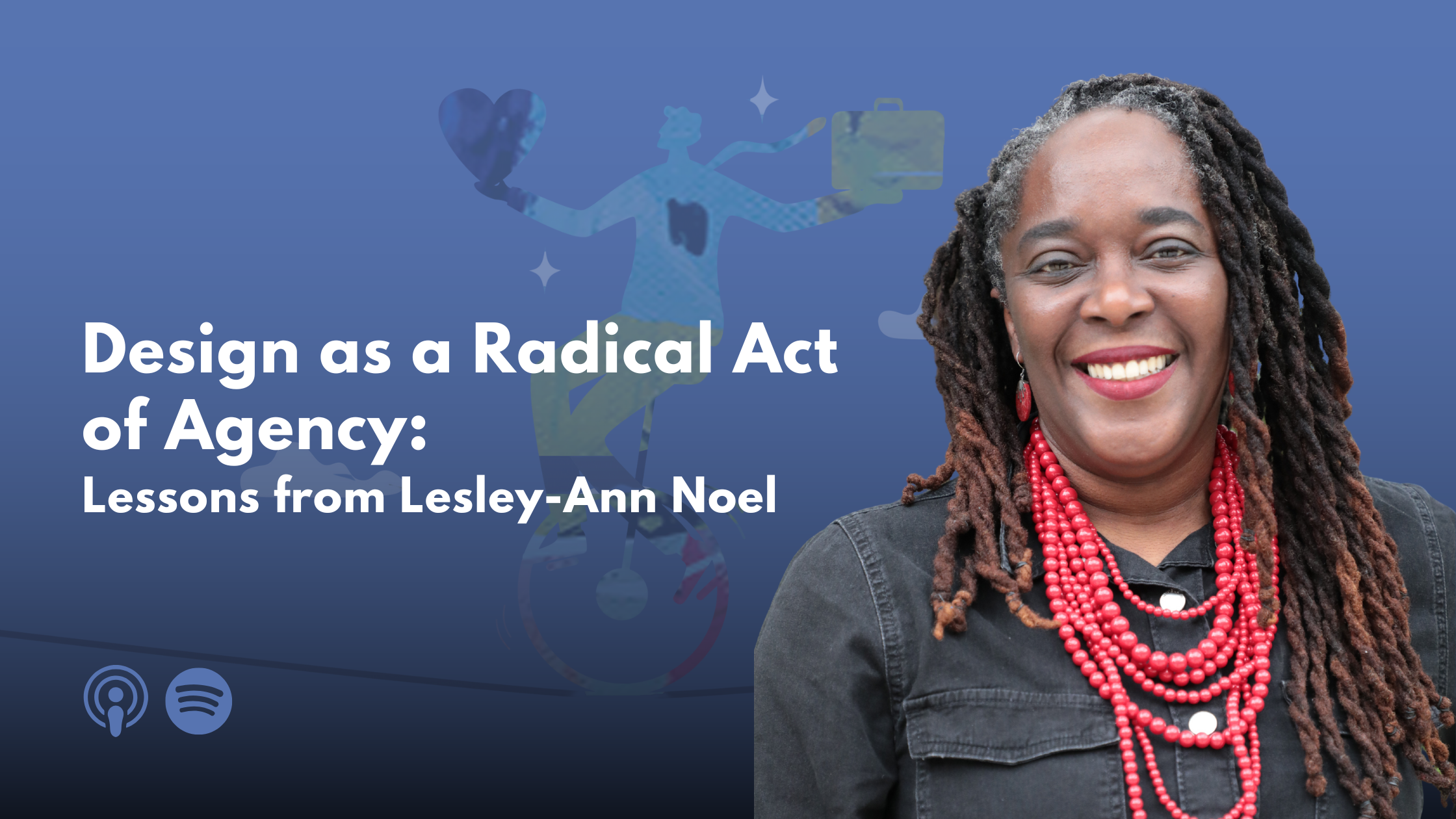In this episode of Meaningful Work Matters, Andrew is joined by Lesley-Ann Noel, Dean of Design at OCAD University and author of Design Social Change. Together they explore how design can be a radical act of agency that transforms workplaces and communities. The conversation covers the importance of self-awareness, listening deeply beyond empathy, and adopting an abolitionist mindset when incremental change is not enough.
Noel also shares why balancing anger with joy is essential for sustaining meaningful work over the long term.
When most people think of design, they picture creative problem-solving or innovative products. For Noel, design is also a tool for building a more equitable future, one intentional choice at a time.
Starting with Self-Awareness
For Noel, the first step in designing meaningful change is knowing yourself. She draws on Paulo Freire’s concept of critical consciousness and adapts it for designers and change-makers.
“We have to figure out what is important to us, and how that shapes the issues we focus on,” she explains. “We also have to see where we might have a bias, and how that will affect the work we do.”
She encourages declaring positionality, a practice from qualitative research where you articulate your identity, values, and lived experiences in relation to the work. In her own research, acknowledging her role as a mother influenced the questions she asked and the communities she worked with.
Self-awareness is not self-centeredness. Instead, it is the foundation for designing responsibly. When we understand our own lens, we can make more intentional decisions about where and how we focus our energy.
Listening Beyond Empathy
Empathy is an important part of design, but it has limits. As Noel explains, true understanding requires going beyond imagining how someone else feels. It means getting closer, asking harder questions, and paying attention to what is not said.
She offers examples from her own work where nonverbal cues, cultural practices, and even community anger were vital signals. In one case, she described how feedback from stakeholders was more valuable when she focused on the underlying message rather than the tone in which it was delivered.
“We cannot design well from only our point of view. We have to get as close as possible to other perspectives, often by working side-by-side with people.”
Listening beyond empathy is about creating proximity. It is also about co-design, giving people voice and choice in shaping the solutions that affect them. This principle applies equally in organizational leadership, where employee input and lived experience should shape workplace decisions.
The Abolitionist Mindset
One of the most striking ideas Noel shares is the abolitionist mindset.
It is a simple but powerful question: When is incremental change not enough?
An abolitionist mindset recognizes when a system or practice is too harmful to improve gradually and must be ended entirely. Noel describes colleagues at OCAD University who have applied this thinking to institutional policies, such as ensuring graduates who change their gender identity can have their chosen name on their degree.
This mindset invites us to confront the uncomfortable truth that some structures cannot be fixed. For leaders, it is a reminder to look for the policies, habits, and systems in our workplaces that perpetuate inequity, and to have the courage to stop them outright.
Anger as Fuel, Joy as Sustenance
Noel speaks openly about the role of emotions in social change. Anger, when harnessed, can be a powerful motivator. She recalls a mentor once challenging her to turn her frustration into clear, purposeful action. That guidance shaped much of her work.
“I have done a lot of angry work that has been very successful,” she says. “It is like how musicians sometimes write their best music when they are heartbroken.”
But anger alone is not enough. Sustaining change requires joy. Joy provides the energy to continue movements over the long term. For Noel, moments of joy come from collaborating with communities, celebrating wins, and seeing tangible results from the work.
Key Takeaways
Know yourself to create change. Understanding your values, biases, and lived experiences shapes how you see problems and imagine solutions. This is ongoing work that requires revisiting your perspectives over time.
Listen beyond empathy. Co-create with those affected and pay attention to unspoken cues and deeper needs. This requires time, trust, and humility, and may slow the pace but strengthens outcomes.
Adopt the abolitionist mindset when needed. Recognize when systems must be ended rather than reformed. Be ready for resistance and prepare to articulate the case for change clearly.
Balance anger with joy. Use anger to spark action and joy to sustain it over time. Without moments of joy, the emotional demands of change-making can lead to burnout.
Final Thoughts
Noel’s perspective reframes design as more than a creative discipline. It is a way of exercising agency, building equity, and fostering the conditions for meaningful work in any context.
Whether you are leading a team, shaping policy, or influencing culture, her approach offers a practical framework for transforming both the systems around you and your own role within them.
Resources for Further Exploration
Design Social Change by Lesley-Ann Noel
Connect with Lesley-Ann on LinkedIn, or follow her on Instagram

